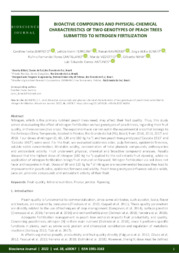Bioactive compounds and physical-chemical characteristics of two genotypes of peach trees submitted to nitrogen fertilization.
Bioactive compounds and physical-chemical characteristics of two genotypes of peach trees submitted to nitrogen fertilization.
Autoria: BARRETO, C. F.; FERREIRA, L. V.; NAVROSKI, R.; BENATI, J. A.; FLORES CANTILLANO, R. F.; VIZZOTTO, M.; NAVA, G.; ANTUNES, L. E. C.
Resumo: Nitrogen, which is the primary nutrient peach trees need, may affect their fruit quality. Thus, this study aimed at evaluating the effect of nitrogen fertilization on two genotypes of peach trees, regarding their fruit quality, in three consecutive crops. The experiment was carried out in the experimental area that belongs to the Embrapa Clima Temperado, located in Pelotas, Rio Grande do Sul (RS), Brazil, from 2016, 2016, 2017 and 2018. Four doses of nitrogen (0, 60, 120 and 180 Kg ha-1) and two peach tree genotypes (?Cascata 1513? and ?Cascata 1067?) were used. For the fruit, we evaluated epidermis color, pulp firmness, epidermis firmness, soluble solids concentration, titratable acidity, concentration of total phenolic compounds, anthocyanins and antioxidant activity. Fruit underwent physical, chemical and bioactive compound analyses. Results showed that the highest dose of nitrogen (180 Kg ha-1) applied to the soil retards fruit ripening, while no application of nitrogen fertilization brings fruit maturation forward. Nitrogen fertilization via soil does not favor anthocyanins in fruit. Doses of 60 and 120 Kg ha-1 of nitrogen are recommended because they lead to improvement in peach color, epidermis firmness and acidity. Peach tree genotypes influence soluble solids, juice pH, phenolic compounds and antioxidant activity of their fruit.
Ano de publicação: 2022
Tipo de publicação: Artigo de periódico
Unidade: Embrapa Clima Temperado
Palavras-chave: Amadurecimento, Fruta, Nutrição, Prunus Persica, Qualidade
Observações
1 - Por padrão são exibidas publicações dos últimos 20 anos. Para encontrar publicações mais antigas, configure o filtro ano de publicação, colocando o ano a partir do qual você deseja encontrar publicações. O filtro está na coluna da esquerda na busca acima.
2 - Para ler algumas publicações da Embrapa (apenas as que estão em formato ePub), é necessário ter, no celular ou computador, um desses softwares gratuitos. Sistemas Android: Google Play Livros; IOS: iBooks; Windows e Linux: software Calibre.
Acesse outras publicações
Acesse a Base de Dados da Pesquisa Agropecuária (BDPA) para consultar o acervo completo das bibliotecas da Embrapa.

